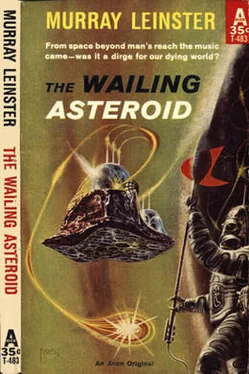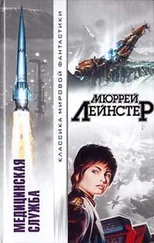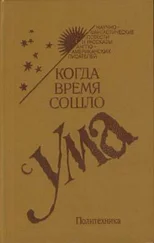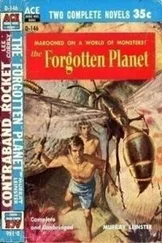He looked at the small fire. There were curious, familiar fragrances in the air. Over to the west the sun sank in a completely orthodox glory of red and gold. The larger moon swam serenely in the sky.
"I'm afraid," said Pam, "that we won't eat tonight unless we can get back to the fortress and the ship. I guess we're farther from our dinners than most people ever get. Did you say five hundred light–years?"
"Ask Keller," grunted Burke. "I've got to think."
Far off in the new night there was something like a birdsong, though it might come from anything at all. Much nearer there were peculiarly maternal clucking noises. They sounded as if they might come from a bird with a caricature of a bill and stumpy, useless wings. There was a baying noise, very far away indeed, and Burke remembered that the ancestry of dogs on Earth was as much a mystery as the first appearance of mankind. There were no wild ancestors of either race. Perhaps there had been dogs with the garrison of the fortress, which might be five hundred light–years away, in one sense, but could not be more than a few yards, in another.
Holmes squatted by the fire and built it up to brightness. Keller came back to the circle of flickering light. His forehead was creased.
"The constellations," he said unhappily. "They're gone!"
"Which would mean," Burke told him absently, "that we're more than forty light–years from home. They'd all be changed at that distance."
Holmes seated himself beside Pam. They had reached an obvious understanding. Burke's eyes wandered in their direction. Holmes began to speak in a low tone, and Pam smiled at him. Burke jerked his head to stare at Sandy.
"I think I forgot something. Should I ask you again to marry me? Or do I take it for granted that you will?—if we live through this?" He didn't wait for her answer. "Things have changed, Sandy," he said gruffly. "Mostly me. I've gotten rid of an obsession and acquired a fixation—on you."
"There," said Sandy warmly, "there speaks my Joseph! Yes, I'll marry you. And we will live through this! You'll figure something out, Joe. I don't know how, but you will!"
"Yes–s–s," said Burke slowly. "Somehow I feel that I've got something tucked away in my head that should apply. I need to get it out and look it over. I don't know what it is or where it came from, but I've got something…."
He stared into the fire, Sandy nestled confidently against him. She put her hand in his. The wind blew warm and softly through the trees. Presently Holmes replenished the fire.
Burke looked up with a start as Sandy said, "I've thought of something, Joe! Do you remember that dream of yours? I know what it was!"
"What?"
"It came from a black cube," said Sandy, "which was a cube that somebody from the garrison took to Earth. And what kind of cube would they take? They wouldn't take drill–instruction cubes! They wouldn't take cubes telling them how to service the weapons or operate the globes or whatever else the fortress has! Do you know what they'd take?"
He shook his head.
"Novels," said Sandy. "Fiction stories. Adventure tales. To—experience on long winter evenings or even asleep by a campfire. They were fighting men, Joe, those ancestors of ours. They wouldn't care about science, but they'd like a good, lusty love story or a mystery or whatever was the equivalent of a Western twenty thousand years ago. You got hold of a page in a love story, Joe!"
"Probably," he growled. "But if I ever dream it again I'll know who's behind those waving branches. You." Then, surprised, he said, "There were flutings when I came through the matter–transposer. They've stopped."
"They sounded when I came through, too. And when Pam and Holmes and Keller came. Do you know what I think they are?" Sandy smiled up at him. "' You have arrived on the planet Sanda. Surface–travel facilities to the left, banking service and baggage to the right, tourist accommodations and information straight ahead. ' We may never know, Joe, but it could be that!"
He made an inarticulate sound and stared at the fire again. She fell silent. Soon Keller was dozing. Holmes strode away and came back dragging leafy branches. He made a crude lean–to for Pam, to reflect back the warmth of the fire upon her. She curled up, smiled at him, and went confidently to sleep. A long time later Sandy found herself yawning. She slipped her fingers from Burke's hand and settled down beside Pam.
Burke seemed not to notice. He was busy. He thought very carefully, running through the information he'd received from the black cubes. He carefully refrained from thinking of the desperate necessity for a solution to the problem of the Enemy. If it was to be solved, it would be by a mind working without strain, just as a word that eludes the memory is best recalled when one no longer struggles to remember it.
Twice during the darkness Holmes regarded the blackness about them with suspicion, his hand on the small weapon Pam had passed to him. But nothing happened. There were sounds like bird calls, and songs like those of insects, and wind in the trees. But there was nothing else.
When gray first showed in the east, Burke shook himself. The jagged small moon rose hurriedly and floated across the sky.
"Holmes," said Burke reflectively. "I think I've got what we want. You know how artificial gravity's made, what the circuit is like."
To anybody but Holmes and Keller, the comment would have seemed idiotic. It would have seemed insane even to them, not too long before. But Holmes nodded.
"Yes. Of course. Why?"
"There's a chooser–circuit in the globes," said Burke carefully, "that picks up radiation from an Enemy ship, and multiplies it enormously and beams it back. The circuit that made the radiation to begin with has to be resonant to it, as the globe burns it out while dashing down its own beam."
"Naturally," said Holmes. "What about it?"
"The point is," said Burke, "that one could treat a suddenly increasing gravity–field as radiation. Not a stationary one, of course. But one that increased, fast. Like the gravity–fields of the Enemy ships, moving faster than light toward our sun."
"Hmmmm," said Holmes. "Yes. That could be done. But hitting something that's traveling faster than light—"
"They're traveling in a straight line," said Burke, "except for orbiting around each other every few hours. There's no faster–than–light angular velocity; just straight–line velocity. And with the artificial mass they've got, they couldn't conceivably dodge. If we got some globes tricked up to throw a beam of gravity–field back at the Enemy ships, there might be resonance, and there's a chance that one might hit, too."
Holmes considered.
"It might take half an hour to change the circuit," he observed. "Maybe less. There'd be no way in the world to test them. But they might work. We'd want a lot of them on the job, though, to give the idea a fair chance."
Burke stood up, creaking a little from long immobility.
"Let's hunt for the way back to the fortress," he said. "There is a way. At least two crazy birds were marching around in the fortress' corridors."
Holmes nodded again. They began a search. Matter transposed from the fortress—specifically, the five of them—came out in a nearly three–walled alcove in the side of what had once been a magnificent building. Now it was filled with the trunks and stalks of trees and vines which grew out of every window–opening. There were other, similar alcoves, as if other matter–transposers to other outposts or other worlds had been centered here. They were looking for one that a plump, ridiculous bird might blunder into among the broken stones.
They found a metal plate partly arched–over by fallen stones in the very next alcove. They hauled at the tumbled rock. Presently the way was clear.
Читать дальше







